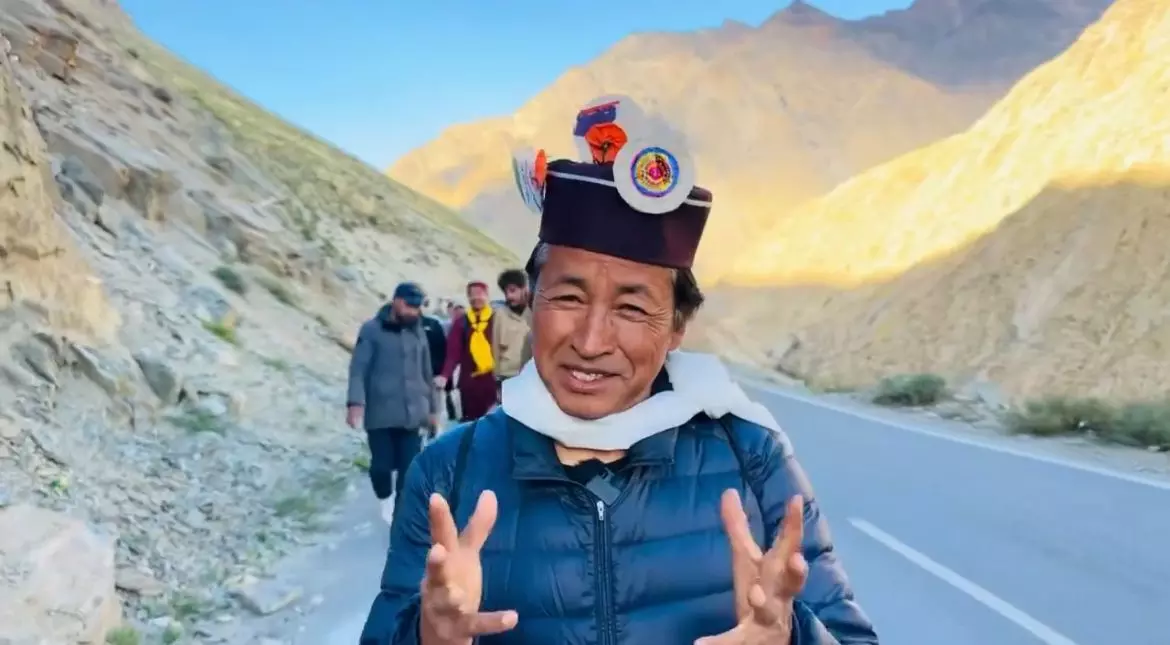Climate activist Sonam Wangchuk begins Leh-Delhi padayatra, seeks constitutional safeguards for Ladakh
Wangchuk has urged the Centre to include Ladakh in the Sixth Schedule of the Indian Constitution and allow local communities to enact laws
By Anoushka Caroline Williams
Renowned climate activist Sonam Wangchuk
Hyderabad: Renowned climate activist Sonam Wangchuk, along with 75 volunteers, is currently leading a padayatra (foot march) from Leh to New Delhi.
Sonam Wangchuk who inspired Aamir Khan's Rancho character in 3 Idiots has launched a peaceful struggle seeking constitutional safeguards for Ladakh after it was declared union territory post abrogation of Article 370.
The march, which began on September 1, 2024, aims to raise awareness about the demands of Ladakh's people for autonomy and environmental protection.
Wangchuk has urged the Centre to include Ladakh in the Sixth Schedule of the Indian Constitution and allow local communities to enact laws to safeguard their land and cultural identity.
"We felt like orphans in our own Union Territory Ladakh where no such support was provided to the weak and elderly yatris despite many appeals," he said.
His appeal for Sixth Schedule status seeks to protect Ladakh’s environment and culture from industrial exploitation.
Appeal to Prime Minister Narendra Modi
In July, during Prime Minister Narendra Modi's visit to the Dras sector for the 25th anniversary of Kargil Vijay Diwas, Wangchuk submitted a memorandum outlining the demands of the people of Ladakh. However, he has not received a response from the government. He urged the Prime Minister to intervene and fulfill the long-standing demands of Ladakh’s leadership.
"Ladakh is an ecologically fragile region facing industrial and climate-related challenges. I urge the prime minister to include it in the Sixth Schedule of the Constitution to safeguard the autonomy of its people,” Wangchuk said at a virtual press conference.
Demand for Law-Making Powers
Wangchuk criticized the current state of governance in Ladakh, particularly the limited powers granted to the Ladakh Autonomous Hill Development Councils (LAHDCs) in Leh and Kargil. "The people of Ladakh want law-making powers too," he said, highlighting that the current authority is restricted to spending development funds.
Wangchuk also expressed concerns over the creation of five new districts in Ladakh, saying that their decision-making powers remain unclear. "It would be unfortunate if these districts have not been granted such powers," he added.
Renewable Energy Projects and Industrial Impact
Ladakh’s potential for renewable energy generation has drawn the attention of both the government and private companies. The region receives around 320 clear sunny days per year and has the potential to generate 35 GW of solar energy and 100 GW of wind energy. The government has approved a 13-GW renewable energy project, including a 7.5-GW solar park in Ladakh.
However, Wangchuk raised concerns about these developments, arguing that they threaten traditional livelihoods in the region, such as agriculture, herb cultivation, and pashmina wool production. "Solar-power projects are being allocated land without the consent of the LAHDCs," he said, criticizing the focus on industrial expansion at the expense of local interests.
Effects of Climate Change on Ladakh
Another key focus of Wangchuk’s padayatra is to raise awareness of the severe impacts of climate change in Ladakh. The melting of Himalayan glaciers, which is accelerating due to global warming, could have disastrous consequences for nearly two billion people dependent on these water sources. Wangchuk called for a balanced approach to development that prioritizes environmental sustainability.
"Through this march, I aim to draw the attention of world leaders and the global community to the dangers facing Ladakh," Wangchuk said. He noted that Ladakh’s fragile ecology requires careful management, not reckless industrialization.
Previous Efforts for Statehood and Sixth Schedule Inclusion
Earlier this year, Wangchuk and other activists undertook a 21-day hunger strike to demand full statehood for Ladakh and its inclusion under the Sixth Schedule. Despite widespread support from the region's people, the government has yet to act on these demands. Wangchuk accused the Bharatiya Janata Party (BJP) of making unfulfilled promises, particularly its pledge to grant full statehood during the 2019 elections and Leh Hill Council elections in 2020.
"The government has withdrawn its promise to provide tribal area status and full statehood to Ladakh under pressure from industrialists, who want to exploit the resources of the ecologically fragile region," Wangchuk said, pointing to vested interests behind the delay in action.
No Political Intentions
In response to speculation about his involvement in politics, Wangchuk clarified that his padayatra is unrelated to the upcoming Assembly elections in various states. “I have no intention of joining politics, and we are considering avoiding Haryana, which is about to hold elections,” he said, distancing himself from political motivations.
Despite the challenges ahead, Wangchuk remains committed to continuing his peaceful protest until meaningful dialogue resumes with the Centre. "A single march won’t solve the issue, but it is a step towards resuming discussions on the demands of the Ladakhi people," he said.